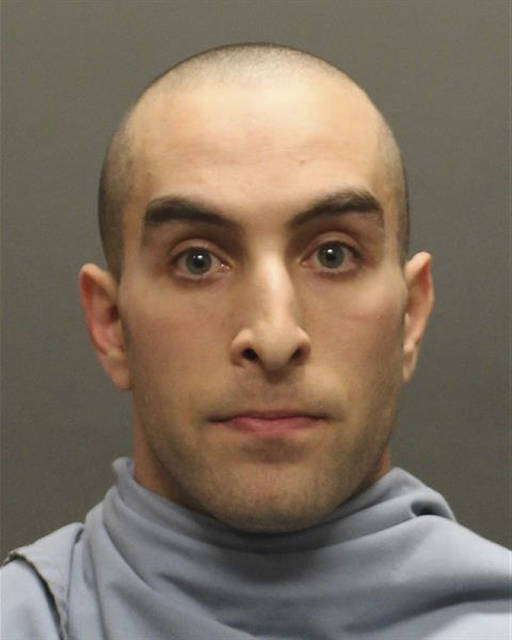PHOENIX — A deputy U.S. marshal serving a fugitive arrest warrant against a man accused of stalking a female police sergeant after she seized a handgun and ammunition from him last year has been shot and killed outside a Tucson house.
The suspect had recently visited the Tucson Police Department, where he confronted the sergeant in person, then filed an online complaint about last year’s seizure of his weapon, demanding that she and other officers be “arrested” and warning against the possibility of a “shootout at the OK Corral,” authorities said.
Chase White, 41, was shot while serving the warrant Thursday night. White died later at a hospital, the U.S. Marshals Service said Friday. He had a wife and four children ranging in age from 7 to 14 and had been scheduled to start a deployment of up to three years with the Air Force Reserve on Monday.
The suspect, Ryan Phillip Schlesinger, was arrested after an hourlong standoff at the home.
Friday filings in federal court show that Schlesinger was arrested on a warrant charging him with first-degree murder of a federal officer. The crime carries a penalty of death or life imprisonment and the FBI will lead the investigation, assisted by Tucson police and the Bureau of Alcohol, Tobacco, Firearms and Explosives.
The earlier warrant had accused Schlesinger of stalking Sgt. Amber Kingman, who was involved in his earlier arrest and the seizure of his Glock handgun and ammunition.
The complaint against Schlesinger, 26, said the Marshals Service was serving the warrant at a home on the city’s north side about 5:30 p.m. Thursday when the suspect fired, striking White. Schlesinger was not wounded when agents returned fire.
Schlesinger was taken into custody about an hour later when he emerged from the house wearing body armor and a ballistic helmet.
Officers from local and federal law enforcement agencies mourned White at a Friday news conference at the Tucson federal courthouse, with U.S. Marshal David Gonzales of the District of Arizona choking up several times. Gonzales says he and others had endured “an impossibly hard day” and it will “take us a long time to heal.”
The complaint said the warrant sprang from an Aug. 18, 2017 incident in which Tucson officers, including Kingman, went to Schlesinger’s house on a petition related to a section of state law dealing with health matters.
Law enforcers at the conference declined to answer questions about Schlesinger’s mental health. “His mental issues will be part of these investigations,” Gonzales said.
When the Tucson officers reached the entryway of Schlesinger’s bedroom, he threatened to kill them and reached for a Glock. Officers using a stun gun arrested Schlesinger and seized the handgun, along with “a high capacity magazine loaded with specialized ammunition designed for increased penetration.”
Schlesinger in April began sending threatening emails to Tucson police demanding the return of his gun and other property.
The complaint said Schlesinger told Tucson detectives July 3 he was sending the emails in “retaliation” for the seizure of his property and had “been planning to come to the police station on that day to arrest several officers.” Schlesinger reportedly said that if the officers resisted arrest, “force would be used.” He replied “no comment” when asked if he had access to firearms.
“Schlesinger stated that he believed his actions were justified by the U.S. Constitution and that he was prepared to defend the Constitution by any means necessary,” the complaint stated. It said that at the time there were two active injunctions barring Schlesinger from harassment and from possessing firearms.
Throughout July, August and September, the complaint said, Schlesinger repeatedly showed up at the police department to “arrest” Kingman, knocked on her parents’ front door and alleged she and other officers had “kidnapped, assaulted, conspired and unlawfully imprisoned him in the Crisis Response Center.”
When Schlesinger went to police headquarters Nov. 20, he saw Kingman and addressed her by name.
Two days later, he filed an online complaint, saying Kingman was on his “list” and recommending the department “arrest the criminals listed in my report so I don’t have to. I don’t think anybody wants this turning into shootout at the OK Corral.”
Stuart De Haan, an attorney representing Schlesinger in a harassment case pending in Pima County Justice Court in Tucson, did not immediately respond Friday to a telephone call seeking comment.
Schlesinger was booked into the Pima County jail in Tucson and made an initial appearance in court Friday. A detention and preliminary hearing was set for Tuesday.
Raised in central Illinois, White had been with the U.S. Marshals Service since 2015. He was on active duty in the Air Force from 2000-2007 and was currently a lieutenant colonel in the Air Force Reserve, serving with the 926th Wing at Nellis Air Force Base, Nevada and preparing for a deployment.
David J. Anderson, Acting Deputy Director of the U.S. Marshals Service, called White a “hero” who had been performing a dangerous job.
First Assistant U.S. Attorney Elizabeth A. Strange of the Arizona District said White’s death was a reminder “of the dangers our dedicated law enforcement partners willingly face daily in the line of duty.” Tucson Police Chief Chris Magnus said it had been “a tragic night for law enforcement in Tucson and across the state of Arizona.”
Arizona Gov. Doug Ducey on Twitter expressed condolences to the deputy marshal’s family and said “prayers go out to his family and all of Arizona law enforcement.” He ordered that flags at state buildings to be lowered to half-staff through Saturday evening.
The Marshals Service said the deputy U.S. marshal was the first killed in the line of duty in Tucson in 66 years.
———
Associated Press writer Paul Davenport contributed from Phoenix.



